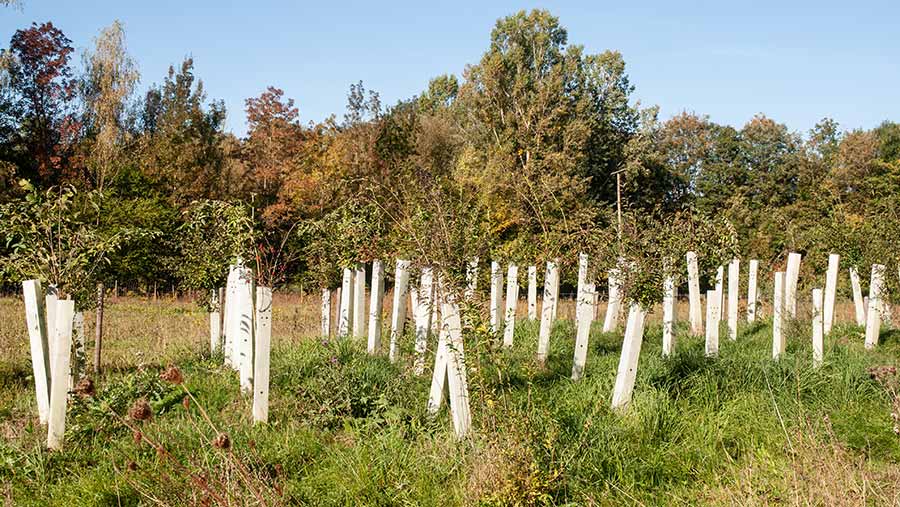Velcourt boss urges caution in carbon offset ‘gold rush’
 © Adobe Stock
© Adobe Stock A carbon offset “gold rush” risks distracting UK farmers from the more important goal of reaching net zero, the head of farming company Velcourt has warned.
Efforts to mitigate climate change through carbon offsetting and emissions trading schemes have attracted media attention, and they are seen as a way to alleviate the upcoming loss of Basic Payment Scheme (BPS) direct payments.
But Nick Shorter, managing director of Velcourt, Britain’s biggest farm management company, warned that the industry must be careful not to put itself forward as the “poster child” of the solution, before it first addressed its own contribution to climate change.
See also: Net-zero demo farm’s three-pronged approach to cutting carbon
“I genuinely believe that this whole area [carbon credits] is going to offer real opportunity and a real value add to land, but I’m cautious that the industry seems to think it’s in a bit of a gold rush at the moment,” Mr Shorter told a Velcourt press briefing on Thursday (21 October).
“Everyone’s heading off over the hill with a pickaxe and no one’s actually quite sure what the gold is going to look like, or how much of it is going to be there.”
Mr Shorter said agriculture can and should play an important role in offsetting carbon emissions. But as land managers, the industry needed to demonstrate its own responsibilities first “before we put our hand up as global saviours”.
For example, it was all very well for farmers to put 10ha of land into afforestation or cover crops. But if, on the other side of the hedge, they were applying 240kg/ha of ammonium nitrate and using 100 litres/ha of diesel, they were still net emitters.
Velcourt’s brief is to get farm businesses into a position where they are genuine net sequesterers, as opposed to just saying they are doing something that improves their carbon footprint.
Mr Shorter also disagreed with commentators who have suggested farmers could sell their carbon multiple times if they join government schemes and private finance initiatives.
Opportunities
Nick Down, Velcourt’s senior farm manager and environmental lead, said there was no doubt there would be opportunities for biodiversity net gain and private investment in carbon credits in areas covered by the company.
But the farming industry was feeling “slightly nervous” about “jumping in too quickly” to carbon offsetting schemes before accredited systems were in place.
“We can see in the background some considerable pots of money being put together to invest in these areas, but they all bring their own implications when it comes to some of our clients, particularly on taxation,” said Mr Down.
“But there is no doubt that there is an appetite from both sides to get involved, and I can very much see private money will be part of this process, and so does the Treasury.”
Farms must embrace significant change over next three years
Farming faces significant change in the next three years and profitability will come under pressure across all sectors, says Velcourt’s Nick Shorter.
Since Defra announced plans to withdraw BPS payments over the coming years, the arable sector has been “buffered” by the rise in wheat prices from £160/t to £210/t, the Velcourt managing director said.
But he warned that strong market prices “will not last forever” and farm businesses were already seeing massive inflationary pressure looking ahead to next year and beyond.
“We’re all secretly hoping fertiliser prices are going to come down, but if it’s sustained at the current level, that’s going to materially change the operating cost base of pretty much every farm in the country,” he added.
Mr Shorter said farmers were traditionally commodity producers, but they would have to use their land to explore new areas that were classified as an output.
Asked what farm businesses could do now to prepare for the next three years, Mr Shorter said: “First, focus on unit cost to truly understand what their businesses are costing them… If you don’t know it, you can’t manage it.
“Second, compare your performance with others and see where you can learn lessons. So, proper benchmarking. It’s all very well knowing your unit costs. But what does ‘good’ look like?
“Third, understand what your business and farm is capable of doing. What is it capable of, today and in the future? Once you understand this, you can use the previous two pieces of information to make a plan on what the business is going to look like in three years’ time.”
